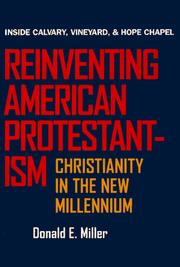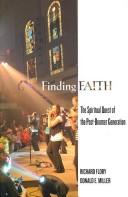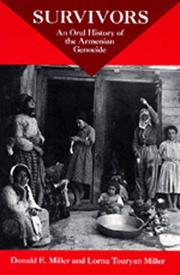| Listing 1 - 10 of 19 | << page >> |
Sort by
|

ISBN: 0520209389 Year: 1997 Publisher: Berkeley ; Los Angeles ; London University of California Press
Abstract | Keywords | Export | Availability | Bookmark
 Loading...
Loading...Choose an application
- Reference Manager
- EndNote
- RefWorks (Direct export to RefWorks)
Sociology of religion --- Christian church history --- California --- Calvary Chapel movement --- Protestant churches --- United States --- Forecasting --- California [Southern ] --- Case studies --- Pentecostal churches --- Religious life and customs --- Church history --- 20th century --- Calvary Chapel (Costa Mesa, Calif.) --- Hope Chapel (Hermosa Beach, Calif.) --- Vineyard Christian Fellowship --- California [state]
Book
ISBN: 0814453031 Year: 1972 Publisher: New York, N.Y. American Management Association
Abstract | Keywords | Export | Availability | Bookmark
 Loading...
Loading...Choose an application
- Reference Manager
- EndNote
- RefWorks (Direct export to RefWorks)
Accountancy --- Financial statements --- 658.15 --- Balance sheets --- Corporate financial statements --- Earnings statements --- Financial reports --- Income statements --- Operating statements --- Profit and loss statements --- Statements, Financial --- Accounting --- Bookkeeping --- Business records --- Corporation reports --- Private financial management. Financial administration of enterprises --- Financial statements. --- 658.15 Private financial management. Financial administration of enterprises --- Social Sciences and Humanities. Management studies, Business Administration, Organizational Science -- Business Administration -- Financial Management, Accountancy --- ALLW.

ISBN: 0520922662 0585057133 9780520922662 9780585057132 0520209389 9780520209381 0520209389 Year: 1999 Publisher: Berkeley, California : University of California Press,
Abstract | Keywords | Export | Availability | Bookmark
 Loading...
Loading...Choose an application
- Reference Manager
- EndNote
- RefWorks (Direct export to RefWorks)
During the past thirty years the American religious landscape has undergone a dramatic change. More and more churches meet in converted warehouses, many have ministers who've never attended a seminary, and congregations are singing songs whose melodies might be heard in bars or nightclubs. Donald E. Miller's provocative examination of these "new paradigm churches"--sometimes called megachurches or postdenominational churches shows how they are reinventing the way Christianity is experienced in the United States today. Drawing on over five years of research and hundreds of interviews, Miller explores three of the movements that have created new paradigm churches: Calvary Chapel, Vineyard Christian Fellowship, and Hope Chapel. Together, these groups have over one thousand congregations and are growing rapidly, attracting large numbers of worshipers who have felt alienated from institutional religion. While attempting to reconnect with first-century Christianity, these churches meet in nonreligious structures and use the medium of contemporary twentieth-century America to spread their message through contemporary forms of worship, Christian rock music, and a variety of support and interest groups. In the first book to examine postdenominational churches in depth, Miller argues that these churches are involved in a second Reformation, one that challenges the bureaucracy and rigidity of mainstream Christianity. The religion of the new millennium, says Miller, will connect people to the sacred by reinventing traditional worship and redefining the institutional forms associated with denominational Christian churches. Nothing less than a transformation of religion in the United States may be taking place, and Miller convincingly demonstrates how "postmodern traditionalists" are at the forefront of this change.
Protestant churches --- Pentecostal churches --- Calvary Chapel movement. --- Calvary Chapel movement --- Christianity --- Religion --- Philosophy & Religion --- Calvary Chapel ministries --- Christian sects --- Pentecostalism --- Protestant sects --- Protestantism --- Forecasting. --- Case studies. --- Forecasting --- Case studies --- Calvary Chapel (Costa Mesa, Calif.) --- Hope Chapel (Hermosa Beach, Calif.) --- Vineyard Christian Fellowship. --- Costa Mesa, Calif. --- Costa Mesa (Calif.). --- California, Southern --- United States --- Southern California --- Religious life and customs. --- Church history --- New paradigm churches --- american culture. --- american protestants. --- american religion. --- american society. --- calvary church. --- christian rock music. --- christianity. --- churches. --- congregations. --- hope chapel. --- institutional religion. --- mega churches. --- ministers. --- new paradigm churches. --- post demonizational churches. --- postmodern traditionalists. --- protestantism. --- reinventing traditional worship. --- religion. --- religious studies. --- second reformation. --- sociology. --- united states of america. --- vineyard christian fellowship. --- worship.
Book
Year: 1966 Publisher: New York: American management association,
Abstract | Keywords | Export | Availability | Bookmark
 Loading...
Loading...Choose an application
- Reference Manager
- EndNote
- RefWorks (Direct export to RefWorks)
Book
Year: 1966 Publisher: New York, N.Y. American Management Association
Abstract | Keywords | Export | Availability | Bookmark
 Loading...
Loading...Choose an application
- Reference Manager
- EndNote
- RefWorks (Direct export to RefWorks)
Book
Year: 1966 Publisher: New York : American Management Association,
Abstract | Keywords | Export | Availability | Bookmark
 Loading...
Loading...Choose an application
- Reference Manager
- EndNote
- RefWorks (Direct export to RefWorks)
Book
ISBN: 0972564438 Year: 2003 Publisher: Durham Duke Divinity School
Abstract | Keywords | Export | Availability | Bookmark
 Loading...
Loading...Choose an application
- Reference Manager
- EndNote
- RefWorks (Direct export to RefWorks)

ISBN: 1281397237 9786611397234 0813544262 9780813544267 9780813542720 9780813542737 0813542723 0813542731 Year: 2008 Publisher: New Brunswick, NJ
Abstract | Keywords | Export | Availability | Bookmark
 Loading...
Loading...Choose an application
- Reference Manager
- EndNote
- RefWorks (Direct export to RefWorks)
Despite the masses still lining up to enter mega-churches with warehouse-like architecture, casually dressed clergy, and pop Christian music, the "Post-Boomer" generation-those ranging in age from twenty to forty-is having second thoughts. In this perceptive look at the evolving face of Christianity in contemporary culture, sociologists Richard Flory and Donald E. Miller argue that we are on the verge of another potential revolution in how Christians worship and associate with one another. Just as the formative experiences of Baby Boomers were colored by such things as the war in Vietnam, the 1960's, and a dramatic increase in their opportunities for individual expression, so Post-Boomers have grown up in less structured households with working (often divorced) parents. These childhood experiences leave them craving authentic spiritual experience, rather than entertainment, and also cause them to question institutions. Flory and Miller develop a typology that captures four current approaches to the Christian faith and argue that this generation represents a new religious orientation of "expressive communalism," in which they seek spiritual experience and fulfillment in community and through various expressive forms of spirituality, both private and public.

ISBN: 9780813544267 9780813542720 Year: 2008 Publisher: New Brunswick, N.J. Rutgers University Press
Abstract | Keywords | Export | Availability | Bookmark
 Loading...
Loading...Choose an application
- Reference Manager
- EndNote
- RefWorks (Direct export to RefWorks)

ISBN: 058516357X 0520923278 9780520923270 9780585163574 0520079841 0520219562 9780520079847 9780520219564 Year: 1993 Publisher: Berkeley : University of California Press,
Abstract | Keywords | Export | Availability | Bookmark
 Loading...
Loading...Choose an application
- Reference Manager
- EndNote
- RefWorks (Direct export to RefWorks)
Between 1915 and 1923, over one million Armenians died, victims of a genocidal campaign that is still denied by the Turkish government. Thousands of other Armenians suffered torture, brutality, deportation. Yet their story has received scant attention. Through interviews with a hundred elderly Armenians, Donald and Lorna Miller give the "forgotten genocide" the hearing it deserves. Survivors raise important issues about genocide and about how people cope with traumatic experience. Much here is wrenchingly painful, yet it also speaks to the strength of the human spirit.
Armenian Genocide, 1915-1923 --- Oral history. --- History --- Oral biography --- Oral tradition --- Personal narratives. --- Methodology --- Oral history --- Armenian Genocide survivors
| Listing 1 - 10 of 19 | << page >> |
Sort by
|

 Search
Search Feedback
Feedback About UniCat
About UniCat  Help
Help News
News